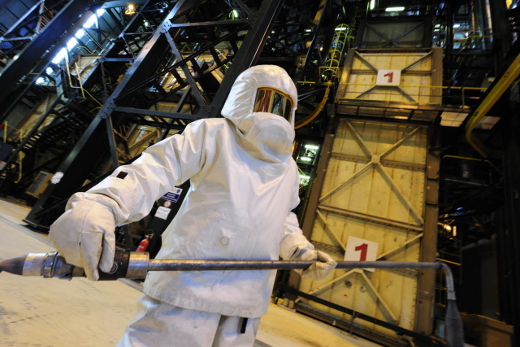Priority for nuclear safety
The accident at Fukushima Daiichi power plant, which was the dramatic result of an unprecedented natural disaster, recalled that to continue to play its role in the future energy mix, nuclear energy must grow within the framework of higher safety standards.
The joint analysis must enable all lessons from this accident to be learnt, which showed the importance of international cooperation and coordination. At the European level, the use of stress tests at nuclear plants led to recommendations which are now implemented in each State, as part of a national action plan. France has carried out complementary safety assessments (CSAs) on all its nuclear power plants, as well as its fuel cycle facilities and research facilities.
We must also work to universalize and strengthen the implementation of existing legal instruments, particularly the Convention on Nuclear Safety 1, the Joint Convention on the Safety of Spent Fuel Management and on the Safety of Radioactive Waste Management 2, the Convention on the Early Notification of a Nuclear Accident 3 and the Convention on Assistance in the case of a Nuclear Accident or Radiological Emergency 4.
France fully supports the action plan on nuclear safety, which was adopted in 2011 and is committed to several themes, in particular :
– to strengthen transparency, each State should make public the table to monitor actions for the implementation of the IAEA action plan on nuclear safety.
France believes that greater transparency is the key to the continued improvement of nuclear safety and the acceptance by citizens of the choice of nuclear energy. It is for this reason, in order to increase transparency, that France has proposed that each Member State make public the national actions for the implementation of the IAEA action plan on nuclear safety.
– promoting peer reviews (IRRS, OSART).
Conducting systematic and regular peer reviews allows certitudes and practices to be compared with the experience from other countries. It would thus seem essential that all Member States observe the commitments they made under the IAEA action plan on nuclear safety by requesting, through multi-year programming, the regular holding of IRRS (Integrated Regulatory Review Service) and OSART ("Operational Safety Review Team") missions, and that they publish the results. The latest missions concluded that France had significantly bolstered the framework for its control of nuclear safety and radiation protection. In 2018, France received an ARTEMIS mission, which evaluated France’s system for the management of radioactive waste with regard to IAEA safety guides and technical recommendations and best practices implemented internationally.
– strengthening the preparation and response to emergency situations.
Improving safety also means preparing for the eventuality of an accident. Training of response personnel and decision-makers is carried out on a regular basis through local, national or international exercises based on a technical failure in a nuclear power plant that could lead to nuclear releases. When facing a disaster disaster whose radiological impact could reach several territories, the major challenge is to ensure consistency in the implementation of actions to protect populations on both sides of borders. Moreover, a request for external assistance may be necessary, and must therefore be provided for as part of the preparation, whether in bilateral, regional or international frameworks. France calls for better coordination of the actions to be taken in the event of an accident, by inviting all Member States to cooperate more actively with the IAEA, and in particular to join RANET (nuclear global assistance network) and to register their national assistance capabilities.
On May 12th 2015, in the framework of the 9th Review Conference of the Treaty on the Non-Proliferation of Nuclear Weapons, France organized a side-event on "Emergency Preparedness and Response to Nuclear and Radiological Accidents".
Ambassador Ms Marion Paradas, Permanent Representative of France to the International Organizations in Vienna, moderated the panel of speakers composed of Ambassador Mr Hamad Al Kaabi, Permanent Representative of the United Arab Emirates in Vienna, Mr Geoffrey Shaw, representative of the General Director of the IAEA, Mr Olivier Isnard from the IRSN (Institute for Radiological Protection and Nuclear Safety) and Ms Priscille Mesme from EDF. Following the presentations, the audience had the opportunity to interact with the speakers.
See the presentations :
- by Mr Shaw : Role of the IAEA in Emergency Preparedness and Response (PDF 2.2 MB) ;
- by Mr Isnard : French national response plan to nuclear or radiological accidents (PDF 201.3 kB) and IRSN Expertise to support the international community during a nuclear emergency (PDF 1.7 MB) ;
- by Ms Mesme : Emergency Response Organization and Preparedness at EDF, French Operator (PDF 1.5 MB).
– working for a global regime of civil nuclear liability.
The Fukushima Daiichi accident showed how important it was for a country which has suffered a nuclear accident to have a suitable civil nuclear liability regime to make sure that the populations concerned receive fair and guaranteed reparations in conditions which are simple to implement. Today, only half of the countries operating nuclear power plants have joined an international civil nuclear liability regime. Faced with this, France is promoting the greatest possible accession to the relevant conventions and is encouraging all Member States to integrate a global civil nuclear liability regime.
It is within this framework that in August 2013 France and the United States signed a joint statement on civil liability for nuclear damage 5.
More details :
Read the French address at the Fukushima conference (in French) (PDF 200.9 kB)

More details :
- See the IAEA Action Plan on Nuclear Safety
- See the table monitoring French actions for the implementation of the IAEA action plan (in French) (PDF 201.5 kB)
- See the page regarding Complementary Safety Assesments (CSA) on the French Nuclear Safety Authority ("Autorité de sûreté nucléaire") website





